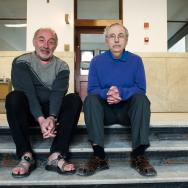University of Chicago mathematician Gregory Lawler has been awarded the prestigious Wolf Prize for pioneering research that helped expand the field of probability into new disciplines.
Awarded by the Israeli Wolf Foundation, the annual prize honors the greatest achievements in the fields of agriculture, chemistry, mathematics, physics, medicine and the arts. It’s the second straight year UChicago scholars earned the top math honor, which was established in 1978 and carries a $100,000 prize.
Lawler, the George Wells Beadle Distinguished Service Professor of Mathematics and Statistics, shares the 2019 award with Prof. Jean-François Le Gall of Paris-Sud University in Orsay. In its award citation, the foundation noted the two mathematicians’ work “became the stepping stone for many consequent breakthroughs.”
“In many ways I see this award as a recognition not just of our work, but of the general progress and vitality of the field of probability in the last 40 years,” said Lawler, a UChicago faculty member since 2006. “These advances have made probability more accessible to many fields that had hard questions that needed mathematical rigor and understanding.”
For example, Lawler said, when physicists are attempting to model a particular phenomenon, there may be so many variables involved that it’s nearly impossible to solve all of the equations involved. One approach is to use random models, and Lawler’s groundbreaking work has led to rigorous analysis of such problems.
“Professor Lawler’s contributions to the field of probability theory are inspiring,” said Angela V. Olinto, dean of the Physical Sciences Division. “We are thrilled that the Wolf Foundation has recognized him with this prestigious prize.”
Lawler’s recognition comes a year after UChicago scholars Alexander Beilinson and Vladimir Drinfeld shared the Wolf Prize in mathematics for their groundbreaking work in algebraic geometry.
One of the concepts Lawler studies is a “random walk,” which describes an object that moves in a series of random steps in any direction. Random walks are useful in models ranging from an atom in a cloud of gas to the spread of an epidemic; they are used in biology, meteorology, chemistry and economics, among other fields.
“I also teach in the financial math program, because the same math is used in pricing stock options as is used in physics,” Lawler said. “When you abstract something, you can use the same arguments and techniques in many different areas. That’s the power of mathematics.”
Lawler is the author or co-author of six books: Intersections of Random Walks (1991) Introduction to Stochastic Processes (1995, 2006); Lectures on Contemporary Probability (1999) Conformally Invariant Processes in the Plane (2005); Random Walk: A Modern Introduction (2010); and Random Walk and the Heat Equation (2010).
He is a fellow of the American Academy of Arts and Sciences, the American Mathematical Society, the Alfred P. Sloan Foundation, the Institute of Mathematical Statistics, and a co-recipient of the George Pólya Prize from the Society for Industrial and Applied Mathematics.
He served as editor-in-chief of the Annals of Probability from 2006 to 2008 and was an editor of the Journal of the American Mathematical Society from 2009 to 2013. He co-founded the Electronic Journal of Probability in 1995 and served as its co-editor until 1999.
The Wolf Prize ceremony will be held in May in Israel.
